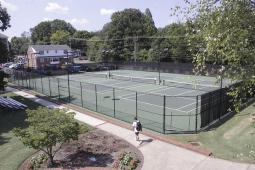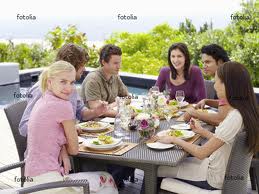Classement - that's how good you are!
The basis of the French tennis circuit is the classement system, translated, your ranking. Many players all over the world become ranking points obsessed, and France is no exception.

As a tennis academy, workouttennis.com must accept the constraints of the classement system, but in fact the benefits far outweigh the downside. Let me list a few for you:-
. the essential element of the French tournament system is that every tournament is seeded in tableaux, or mini tournaments, according to ranking groups. Winners of a mini tableau go up to play in the next tableau of better players.
. your classement encourages you to play tournaments. You get credit for every tournament played, even if you lose some first-rounders. In fact the benefits have been slightly reduced recently, by penalising you for losing matches against lower rankings, but a general rule of thumb is that if you play lots of tournaments your ranking WILL go up.
. the great thing about playing lots of tournaments is that you hope, one day, to get on a roll, win four or five matches in a series. Not only will you meet higher ranked players, for which you'll get higher points for your win, but the fact that you become better and better acclimatised to that tournament, means that you become ever more dangerous for the highly ranked players coming in, seeded for their first match.
Winning your way up the classement
. your classement is a reflection of your true playing level, today. There are of course anomalies. For instance, after a long term injury a player will lose ranking points, and find himself in the next year lower-ranked, therefore playing a load of easy matches, even though his current form doesn't suggest he'd win them. As we know, once you know how to win tennis matches, you generally don't forget, even after a long lay off.
. cost. You can reckon on paying €15 - €18 for a tournament entry. This is very favourable by comparison to tournament inscriptions in other countries, but for this you may only get one singles match.
. FFT licence + insurance. You become registered for a year for around €25, and you have a comprehensive tennis related insurance cover.
. Generally speaking all tournaments follow the same format, so you know what to expect, what to prepare yourself for.
. Many players of all ages are not just registered with the National Federation, they also play tournaments and matches. It isn't just to defend your ranking, nor out of competitiveness that the French serve their own ranking system so well. It is because the whole tennis system is based around measurement of sporting level that the French accept a certain minimum sporting commitment.

Ever calculated the costs of playing tennis?
Where the French classement system fails: -
. beginners. Theoretically the classement system is great for beginners. At the lowest level you are ranked Non classé, that is, no ranking. You should then only face another Non classé in your first match, so someone with the same lack of experience. This is good, but for beginners, it isn't enough. The fact that tennis is an individual game, win or loss, can be very traumatic. I see so many beginners at club level who abandon match tennis rapidly due to the trauma. There should be a fixed rule that at the lowest level, called 4° in France, a minimum of three matches, in a group system, should be guaranteed, per inscription.
. women. Although France does reasonably well at women's professional level, it is no thanks to the way women are treated at club level. Women are generally less competitive, less sporty than men, but in France this cultural difference is even more extreme. The fact that the whole system is set up for matchplay discriminates against women.
. half-committed, or fun, players. In the clubs you'll see few part-time players. The system isn't made for them, they tend to be abused or ignored by the clubs, because all they want to do is hack around the courts in string vest and bermuda shorts, and belt balls over the netting. They have no interest in coaching, serious competition, or regular play. They may be committed elsewhere, other sports, or business, or family. These people don't fit into a system based on ranking.
. social tennis. Even though team tennis works well in France, together with the individual tournaments, these players principally turn up, play, and go home. They have no interest in the clubs or people where they play (even their home clubs!). Socialising is non-existant. When efforts are made to socialise, the competitive nature of what the club produces spills over onto the beer table, rivalries, back-biting and jealousies. Very little teamwork or doubles is developed, so the social side of tennis too suffers. Some, very rare, clubs manage it, but only because they have expressly modified their competition structure. If they follow the classic French model, they never become social tennis clubs.

Social Game
. other ways of doing it. There are other nationalities that have a reputation for being over fixated on a certain way of doing things, and I have to report that the French, the model bureaucrats, are the worst! Their system of classement and production of top professionals works well because of their elite schools. If you don't get into these elite schools it is almost impossible to break through. There is no conception for those other players who are for example, late developers, or who come from other sports. If you weren't a tennis superstar at aged 8, it's difficult to envisage a tennis player conquering the French system.
. doubles. The French don't play doubles. Unfortunately I love doubles, and frequently in club matches a team will prefer to "give" their doubles points to their opponents, and get an early ride home, than have to play a game that they don't appreciate. In recent years the leagues have resorted to giving double value to doubles victories to stop clubs refusing to play! There is a similar failing, or appreciation of doubles at professional level too, so the French reflect the professional game in this respect. For the typical club player, doubles should be very important.
. juniors. Most clubs have very complete junior training programmes, taught, or managed by relatively qualified coaches. So the general technical level of beginner tennis is good. The real problem starts already in the second year of your tennis school. If you haven't already started playing matches for your club, and partaking of individual competitions, in other words, using the classement system, you drift off. No-one in the club, least of all the coaches, is interested in you if you don't go down the classic classement route.
Play tennis doubles - it'll boost your singles
Have A Great Story About This Topic?
Do you have a great story about this? Share it!
